I hereby turn this newsletter over to LtCol Adam C. Tharp …
Preventable Catastrophe?
by Adam C. Tharp
We Agree
Imagine my surprise when my esteemed Twitter debater, Claire Berlinski (@claireberlinski) offered to debate this proposition:
Elected officials should be held to a “reasonable elected official” standard analogous to the reasonable person standard. If they fail to behave with the same degree of care, knowledge, experience, fair-mindedness, and awareness as a hypothetical “reasonable elected official,” voters should relieve them of their responsibilities at the first available occasion.
And I said, “Yes, I absolutely agree.” That’s it, we agreed and the end ...
And We Disagree!
And then she applied this standard, and a guilty verdict, to President Trump that left me, well, verklempt. In my “caveman lawyer” mind I was confused by the magic words being shown on this strange modern invention called Twitter.
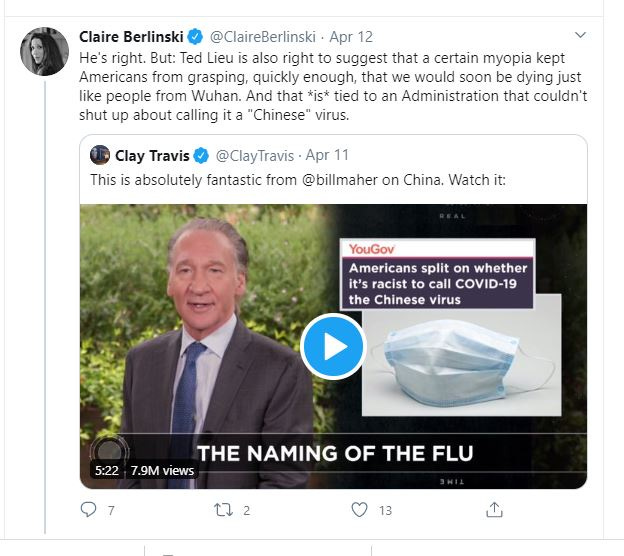
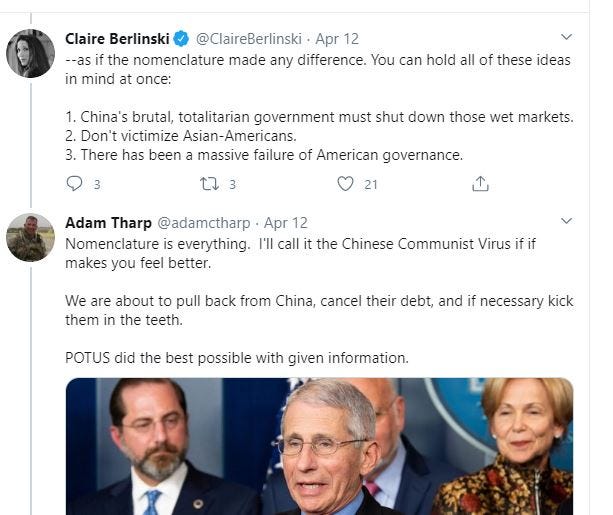
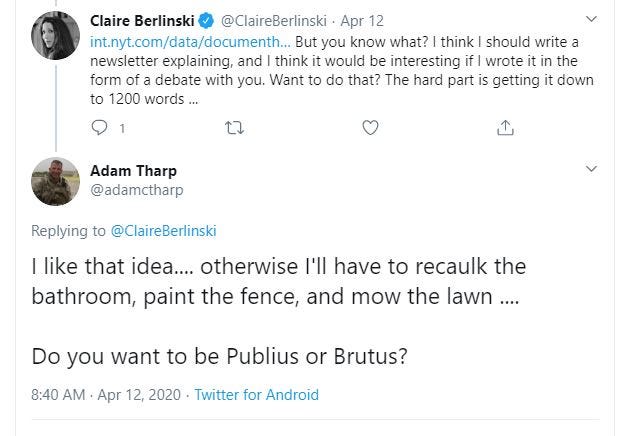
So as a knuckle-dragging, crayon-connoisseur Marine (I’m not really a lawyer, but my wife will confirm I am a caveman), I couldn’t turn down the challenge. It was like Clubber Lang talking smack to Rocky, like Scott Farkis bullying Ralphie, like Ringo asking “Which wallet is yours?” In short, it was a true challenge to defend an opinion with more than just emotion and speculation. It harkened back to the Federalist Papers (hence the Publius and Brutus reference). But mostly, it was something we should do more often: state our positions, defend our positions, rebut the other side, and open our minds to the idea that others may know things we don’t. Well, not in this case, because I’m a Marine, and we’re never wrong (except when we are—but not here).
Quick joke, then I’ll get seriouser.
Q: “How does a Marine change a light bulb?”
A: “He sticks it in the socket and the whole World revolves around him!” (I crack myself up).
OK, enough of the small talk.
Has Trump met the “Reasonable Official” Standard?
The real question is, “Has President Trump met the ‘reasonable person’ standard in dealing with the Communist Chinese Virus?” And was this, as her title claimed, a “preventable catastrophe?” I will say upfront I don’t know if this was preventable, nor does it really matter in determining whether the President met the “reasonable official” standard. What I can do is evaluate President Trump against this standard.
Claire laid out these six assertions.
POTUS was adequately informed to prevent COVID19 and did nothing;
China’s deceit did not preclude a timely and effective response;
A reasonable NOLA official would have cancelled Mardi Gras;
Trump downplayed the virus;
The Red Dawn emails matter;
Ending the Protect program failed the “reasonable official” test.
Okay, she provided decent references, but overall, very flawed logic. Not that some or all might not be true, but she ignores competing explanations or other facts. Fair enough, and actually I thought she did a pretty good job laying out information that on the surface raises important questions. But ...
Predicting, applying causality, and assigning blame require more justification, and more holistic information-gathering, than cherry-picking a few articles, documents, and emails and saying, “Here’s the proof.” Had she offered these caveats to her assumptions and inferences, her argument would have been much stronger; wrong, but stronger.
Usually in presenting my case I lay out my arguments and address rebuttals. Here, I’m going to use rebuttals to lay out my arguments, then present my case. As evidence, Claire provided a grab bag:
The World Health Organization Pandemic playbook;
A timeline of early actions by other countries;
An account of the Mardi Gras faux pas;
POTUS quotes;
The Red Dawn emails (WOLVERINES!);
Protect Program defunding.
To begin, I think it prudent to revisit the “reasonable person” standard; and I’ll go one step further: I’ll define the fiduciary duties expected from elected officials. The reasonable person standard is applied in determining whether an official’s actions were acceptable.
The Standard and the Duties
Claire suggests, and I agree, using the “reasonable person” standard as a guide by which to judge our political leaders. From the “Free Online Dictionary,”
Reasonable Person: A phrase frequently used in tort and criminal law to denote a hypothetical person in society who exercises average care, skill, and judgment in conduct and who serves as a comparative standard for determining liability.
In our debate, a “reasonable official” is one whose decision-making was consistent with the average official (yes, insert joke here, “pretty low standard given our politicians”).
The second part is that the official has specified fiduciary duties. Most common are the duty of care and the duty of loyalty. In simplest terms, the duty of care means, “prudently considering options and making a reasonable decision based on the information, after proper due diligence has been applied to the situation.”
Furthermore, duty of care requires acting in good faith, meaning that the official “genuinely believes the choice he is making for the country is a beneficial decision.” Duty of loyalty means the official acts responsibly for his constituents at all times and always acts in their best interests rather than him or herself.
Assertion 1: POTUS was informed sufficiently to have taken aggressive action to prevent a massive COVID19 outbreak in the United States, but did nothing.
Claire proposes, and again, I agree, that a “reasonable government” would have prepared for pandemics in accordance with the WHO model, and would have executed the plan in a timely fashion.
But she further states, “Any government that had not launched its pandemic plan by January 24, at the latest, was dangerously incompetent and should be held accountable for per capita death and damage to its citizens in excess of that suffered by South Korea.”
This is an unreasonable standard. It suggests that launching the pandemic plan by this date would have led to the outcomes observed in South Korea which, to date, are not “average” but exceptional (four cases per million versus a global average of 20 per million). It discounts countries who launched their plans in a timely manner, but for other reasons (like the Chinese Communist Party being lying scumbags—oops, pardon me, I am just a caveman), their plan was not effective.
I agree: To be considered competent, countries had to begin executing their plan by January 24. Korea is a model to be studied, for sure, but there are too many unresolved variables (at this time) to offer per capita death rates as proof of incompetence.
So, did President Trump fail in his duties? Did he breach the duty of care under the “reasonable official” standard?
No. In fact, the Center for Disease Control began mobilizing by January 3 and executing their playbook by January 7. The timeline below highlights key actions taken by the CDC and President Trump during January and February. The bottom line: The US response was in motion. So under the “reasonable official” standard, President Trump passes. This does not imply the CDC’s plan was effective or that there weren’t mistakes in execution (notably, in test kit production delays). But there’s no evidence that President Trump, through either errors of commision or omission, breached his duty of care.
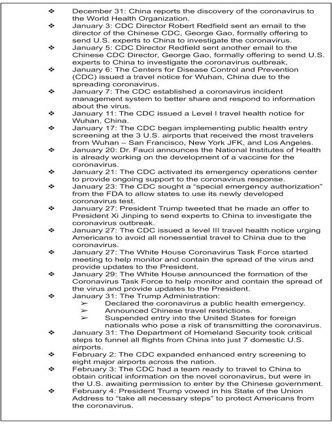
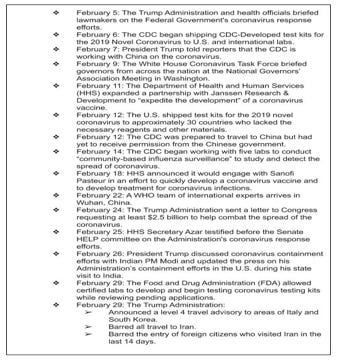
Furthermore, President Trump demonstrated exceptional duty of loyalty to the American people by issuing the travel ban and announcing a public health emergency one day after the WHO designated Covid-19 (aka the CCP Virus) a “public health emergency of international concern.” Why loyalty? Because establishing prohibitions on travel from China during negotiations for the most important trade deal in US-Chinese history directly damaged Trump’s political goals: It was not in his political interest to do so, but he did it anyway.
One could argue the effectiveness of the travel ban is questionable, but it is an irrelevant argument, because at the time, little was known about the virus. It was one of the only executable options. Plus, Dr. Fauci said numerous times the ban saved thousands of lives.
Others argue, “Yes, but 40,000 people have come from China since.” This is true, but demonstrates little understanding of context. Nearly 400,000 people traveled from China during January, or a little over 13,000 per day. Only 500 people per day have made the trip since the ban (four percent of the pre-ban passenger loads). Second, the ban was not a blockade. US Nationals, key business, medical, and other essential people have had to travel to and from China to do their jobs.
Finally, using the “reasonable official” standard, the US is only one of 45 countries or territories that have issued travel restrictions. The first were Hong Kong and Macau on January 27, with the US and most others between January 30 and February Surprisingly, with the exception of Italy and a few other countries, the EU didn’t establish a travel ban until mid-March. So while there’s no error of commision in establishing a travel ban—at worst, the travel ban had no effect on the spread—there is an argument for an error of omission by not establishing the ban. This would be a good future study. Bottomline, President Trump’s travel ban not only met the loyalty duty, it met and exceeded the “reasonable official standard.”
Assertion 2. China’s deceit did not preclude a timely and effective response.
It is not an understatement to say, THE CHINESE COMMUNIST PARTY ARE LYING SCUMBAGS AND WHEN THIS S*&^SHOW IS OVER WE’RE GOING TO KICK THEIR ASS (oops, caveman mode again).
So is Claire’s assertion correct? Well there’s a lot we don’t know, but we can make some assumptions and draw from some ongoing analysis. It’s becoming more apparent that COVID19 is often transmitted by asymptomatic carriers. Screening mechanisms, like taking temperatures or checking for respiratory symptoms, are probably ineffective. This probably explains why travel screening and bans were only marginally effective. But could we have learned this sooner if the LYING BASTARDS had let us in in early January? I would argue the reasonable man says, “Yes.” The first known case was confirmed in the US on January 20 in a man who flew out of Wuhan on the 15th. But what if, by January 10th, we had understood the severity of the virus? Instead, the WHO didn’t get in until February 22 (and very nearly didn’t get in at all.) It seems more than a coincidence that the global lockdowns began in the following weeks.
I’ll finish with these two tidbits. China instituted an internal travel ban to and from Wuhan on January 23, but allowed international flights to continue until January 25. Common sense says, “They knew the risks, but allowed their citizens to keep flying out of China for two more days.” In caveman speak, this means the CHINESE COMMUNIST PARTY ARE LYING MURDEROUS BASTARDS. Finally, while this article is over a month old, it puts into numbers the price of honesty (or DISHONESTY, IN THE CASE OF THE LYING MURDEROUS BASTARDS):
Research finds huge impact of interventions on spread of Covid-19
Study suggests number of cases could have been cut by 66% if China had acted a week earlier
The rapid spread of coronavirus around the world could have been substantially curtailed if the broad swath of measures China brought in to control the outbreak were introduced just weeks earlier, researchers say.
Sophisticated modelling of the outbreak suggests that China had 114,325 cases by the end of February 2020, a figure that would have been 67 times higher without interventions such as early detection, isolation of the infected, and travel restrictions.
But if the interventions could have been brought in a week earlier, 66% fewer people would have been infected, the analysis found. The same measures brought in three weeks earlier could have reduced cases by 95%.
Assertion 3. NOLA didn’t know, but should have.
Here, Claire pointed to the Mardi Gras example, arguing that Mayor LaToya Cantrell’s excuse—that she wouldn’t have allowed Mardi Gras to happen if “the government” had informed her of “the dangers”—is no excuse for failing to cancel the event. In other words, Mayor Cantrell had enough information to make her own determination, and therefore failed the “reasonable official” standard.
I don’t have the detailed procedure, but the January 31 Health Emergency Declaration in part is designed to mobilize resources and reporting for states. On February 9, the White House briefed the governors of the situation. All the while, CDC was coordinating with state health agencies. Interesting that the NOLA Health Department posted nothing about Covid-19 until just after Mardi Gras finished. Now, I’m not privy to the information flow between the Louisiana state government and the city of New Orleans, but my guess is there were discussions between the mayor and her health director prior to Mardi Gras.
The fact is, we still did not know enough in February, and there had been no cases in Louisiana. On a February 29 Today Show interview, Dr. Fauci said,
I’ve said that many times, even on this program, you’ve got to watch out because although the risk is low now, you don’t need to change anything you’re doing. When you start to see community spread, this could change and force you to become much more attentive to doing things that would protect you from spread.
This goes back to one, not knowing enough about the virus—not from a lack of trying, but because of CHICOM obfuscations and lies. And two, the experts were applying a SARS/MERS framework to a problem that was not like that—but that’s the model they had. Dr. Birx said, “When you looked at the China data originally,” with 50,000 infected in an area of China with 80 million people, “you start thinking of this more like SARS than you do a global pandemic. The medical community interpreted the Chinese data as, ‘this was serious, but smaller than anyone expected,’” Birx continued. “Because, probably … we were missing a significant amount of the data, now that we see what happened to Italy and we see what happened to Spain.” Birx didn’t join the Coronavirus Task Force until February 26.
So I go back to Claire’s primary assertion: we knew COVID19 was human-to-human transmittable by January 24, therefore we should have responded better. Hindsight bias is difficult to avoid, but even the experts were still trying to understand the situation more than a month later. Should have Mayor Cantrell cancelled Mardi Gras? Based on what? Against what costs? Mardi Gras is the biggest annual event in NOLA, generates a lot of tax revenue, and to shut it down without justification would not be consistent with a “reasonable official” standard. As much as Claire wants to make Mayor Cantrell out as the Mayor of Amity telling Chief Brody and Matt Hooper to pound sand, it’s just not the case. (Note: I really dig the mayor’s jacket.)

Assertion 4. Trump downplayed the virus.
Claire is among the plethora (you’ve just thought of El Guapo) of journalists and pundits who charge the President played down the virus early on. Okay, I agree, so what? What duty did he violate? And was he playing it down because he was uninformed or because there were few cases in the US, and the experts were playing it down? If he deliberately lied to help himself at the public’s expense, you could make the case he was violating the loyalty duty. But Trump is notoriously optimistic, speaks in hyperbole, and really hasn’t changed. Nor was he the only one. Everyone from Pelosi to Boris Johnson to DeBlasio to Cuomo was playing it down. Only the outliers were not.
Senator Tom Cotton was on this immediately. As early as January 22, he tweeted his concerns. During this week, he met the President and pressed for travel restrictions:

Other pundits were on it, too. Tucker Carlson did a segment in the last week of January that staffers say influenced the President’s decision to issue travel restrictions. Likewise, on January 24 Dilbert Creator Scott Adams (he’s been a well-above-average predictor) minced no words about a travel ban, as did Fox pundit Greg Gutfield, on January 28 .
So, as bad as the soundbites are, there’s no indication the President violated his fiduciary duties against the “reasonable official” standard. Very few understood the situation, politicians and experts alike. His remarks were “average” among politicians.
Assertion 5. The Red Dawn Emails mean something.

Really, that’s about all I want to say about the Red Dawn emails.
Why? Because while they are incredibly insightful and prescient, in the end they are mental masturbation by a small group of experts. These folks were on it, really had some great analysis of what was happening, not bad on how events would unfold, and recommended numerous actions …. and it doesn’t appear that the email chain made it out of the small group. Through most of February, the conversation bounced between Carter Mecher and Eva Lee and a few others, even though dozens of officials were included in the chain. More experts started to respond to the emails by late February-early March, but by then it was OBE (Overcome By Events in military speak).
There’s no indication the discussions in the emails made it to the President or other key decision makers. Why? Don’t really know, but if I were a betting man, I’d say these people don’t understand the number one rule in emailing. If it’s really important, put the people who need to know in the TO line, not the CC line. And the number two rule, If it’s really important, follow up with a phone call. Too often, people think an email suffices when in reality, like me, the recipients first check to see if their name is in the TO line; and if not, either delete it or say, “Yeah, I’ll get back to that.” On March 11, one of the experts (name was redacted) wrote:

This indicates the two rules above were not being followed.
What lessons can we draw from the Red Dawn emails?
One, these have no bearing on evaluating President Trump’s fidelity to the fiduciary responsibility or reasonable official standard, assuming he was never briefed about them. And if he was briefed, we’d need to know what other factors he considered in making his decisions before we could arrive at an informed judgment.
Two, this is a classic case of Command Operations Center (COC) 101 failure ... When working on the watch floor, we usually post a sign that says “What do I know? Who needs to know it? Have I told them?” (Refer to email rules 1 & 2.)
Three, this is a great example of a “tipping point” that never happened. These experts were the mavens, but they lacked the salesmen and the connectors to get their analysis to the right leaders (again this is an assumption, although many of their ideas were enacted—just later on the timeline).
Assertion 6. Ending the Protect program was unreasonable.
Claire’s final point was that the Trump administration did not renew USAID’s Protect Program funding. Like the Red Dawn emails, it’s interesting and ... totally irrelevant. One, there’s no indication the President violated his fiduciary duties, and not knowing USAID priorities, I would assume USAID had other, higher-priority programs, to shift their money to (just a guess). But even if he said, “Yes, I want to end this program to do something else I prioritize more,” that’s within his powers, and meets the “reasonable official standard,” because we’re talking about a decision made months before we knew this was coming. Two, there’s no indication the Protect program would have changed our current situation. Why? BECAUSE THE CHICOMS ARE MURDEROUS LYING BASTARDS ... And this program was designed to identify viruses in nature, not ones being leaked out of a LEVEL IV VIROLOGY LAB.
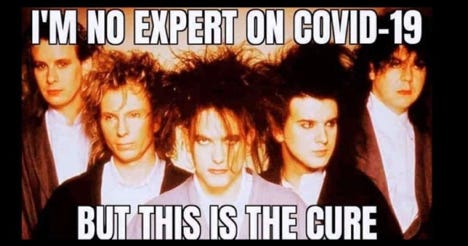
Case Summary
President Trump upheld his fiduciary duties (see preceding 3000 words). The end …
Postscript: I want to say a big thank you to Claire for allowing me to provide a counter-argument. Sure, I think I’m right and she thinks she’s right, but like the Red Dawn emails, irrelevant. The important thing is we’ve had a civil discourse about real and incredibly important questions. Hopefully, reading these newsletters will inspire you to ask questions of your own.
Finally, this is just the opening of the debate. We are so early into this, and we know so little, so who knows? Information may come out that changes my position—or not. Either way, thanks for reading.

Adam C. Tharp served as a United States Marine for 27 years and participated in combat and contingency operations in the Balkans, East Africa, Iraq, Afghanistan, and Southeast Asia. He’s spent the last five years as an operational planner for US military engagements in Europe, Africa, and South America. He is a graduate of the US Army School of Advanced Military Studies and holds Masters in Public and Business Administration.

He also missed his senior year of high school in 1984 fighting off a communist invasion. WOLVERINES! (yes that is a mullet, business in the front - party in the rear- giggity giggity).
Note from Claire: Duke it out in the comments for now, folks—tomorrow, we vote.
(PS: Maybe tomorrow, LtCol Tharp will let me take over his job for a day?)





As a Marine, I concur w and endorse the Col's self-regard and his aggrandizement of our club. :) But I love your stuff always, Claire, and so even with all the advantages one naturally has as a Marine, the Col is still at a disadvantage starting out. Marines always love a challenge. Thanks for the discussion. Of course this can be done - it's how sane adults converse.
Of course, both of you trying to lay the local blame, as a distraction, (as do all the presstitutes, world-wide). and omit the fact that the united snakes invested 3.7 million $ in the Wuhan labs (germ warfare labs) You both have access to Professor Francis Boyle's work on tracing the virus and determining the 'gain-up- procedures used to magnify terminal effects of Cov-Sars 19 g2 virus.. Add the Bill Gates multi-million dollar input, and there you have it The virus is man-made, and made by the 'mighty' us dollar End-of, (millions of folks)